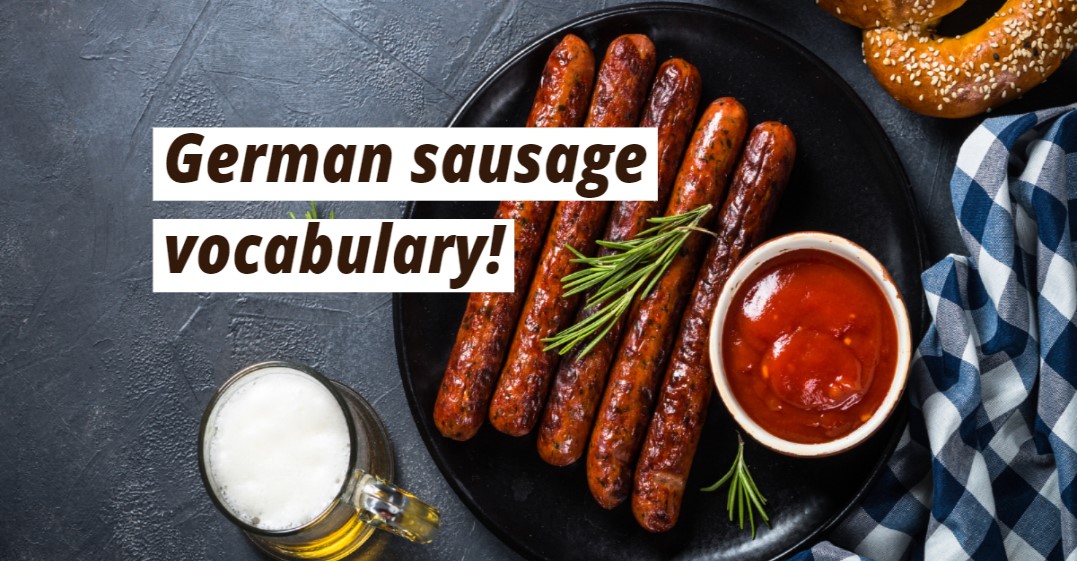Updated on August 29, 2023

Sausage vocabulary in German – 8 idioms

You probably already know that Germans love their meat! They eat sausage for breakfast, meat for lunch and sausage for dinner. The habit of eating meat and especially sausage in Germany is so deeply rooted that it even found its way into the German idiomatic language. Foreigners who are not aware of these idioms and what they describe might often think: “What the heck is wrong with these people? Are they sexist all the time to talk about sausages of men? Or are they constantly hungry running after sausages?”
Here is a little collection of phrases concerning meat or sausage or the direct connection to it and what they actually mean. Enjoy!
No, this does not describe that today everything is about the one sausage you will eat. We could assume that someone wants to explain the specific traits of a certain sausage. Far from right!
This idiom is used when something really important happens and the result of this action is of matter to us.
For example, you are planning to move to Germany. You did all your preparations and all that’s left is your language test for B1. Whether you will succeed in the exam or not will determine your future.
It’s all or nothing!
Often in dialect also said as: Is mir Wurscht!
This is my personal favourite. Let’s try to direct translate it: That is me sausage… wait what?
You remember from the introduction that Germans love sausages and if there is a question to choose a sausage we don’t mind which one we get as long as we get one!
Therefore, to express that we really don’t care about something, we use this expression in slang instead of “Das ist mir egal” – I don’t care.
Another one that has the potential to provoke naughty thoughts. But actually if we look at it closer, it has nothing naughty at all.
If someone wants an extra sausage in German, they are acting like a diva and want favours or special treatment.
Imagine you are going out for dinner with your friends. You chose the restaurant. You know your friends often have extra wishes but today, they are just over the top with it. They are not happy with anything and are asking for special wishes and special treatment all the time.
You can now confidently respond: “Oh Mann! Ihr wollt immer eine extra Wurst haben!” – Oh man you always want to have special treatment.
Everything has an end just the sausage has two. What a phrase! German wisdom is incredible.
So what does that mean and when do we use this idiom? Well, obviously everything we experience ends at some time. It has to. It’s a default mode of our existence and that is good, so new things can approach us. But sometimes we do want things to go on and prolong.
This idiom describes that we have to make peace with the fact that we are not sausages with two ends. We only have one. And even if it seems like a second chance, it is still one. Because once again: we are not a sausage. Which in my opinion is a good thing!
You can use this whenever someone does not want to accept the end of an action or experience.
Be careful. This sentence is not very comforting and works as a thought-terminating cliché.
You poor little sausage!
This phrase is used in two different ways.
Basically, it expresses pity for someone and according to your intonation it can show real empathy, or it can be used as a bullying phrase when we sarcastically pity someone who is complaining about something not worthy to complain about.
Now this one is a funny one that refers to people who are easily offended. Leberwurst is liver sausage, which usually is very smooth. This smoothness is transferred into a personal trait of being easily irritable and sensitive.
Germans are often very rational and can’t deal too much with emotion and sensitivity (Sorry stereotyping again!). Back in the day this trait was even more prominent. So if someone was very sensitive and would get offended by the harsh German way of communication, we would just say:
Don’t play the offended liver sausage! Translated into: Come on. Don’t be like this.
We are now in the sphere of non-sausage. Germans love meat as said, especially pork. But they also love the ones that provide us with the meat. Pigs!
In the German cultural tradition pigs are a symbol of good luck. You will find little stuffed piglets in souvenir shops together with a four leaf shamrock.
Our expression directly translated means: To have a pig. Knowing that pig means luck, it means we are lucky. But in this sense, it even refers to being very lucky in a bad or even dangerous situation.
If someone escapes a bad situation you can say: Wow! Du hast echt Schwein gehabt! – Wow, you really had a pig!
And now we go from meat and sausage to the next most important ingredient… Mustard!
As you know, a German Bratwurst is nothing without Mustard (also Ketchup but we Germans think the real deal is the mustard!)
If someone adds his or her mustard to something, it is rather meant as an insult.
This idiom formed in the 17th century. In rustic German taverns and restaurants you would get complimentary spice to your dish, if you wanted it or not. The phrase to add mustard was then personified (add one’s own mustard) and used in situations when someone contributes their opinion, wanted or unwanted.
In today’s day and age it is only used in a negative way of unwanted contribution of ideas and thoughts.